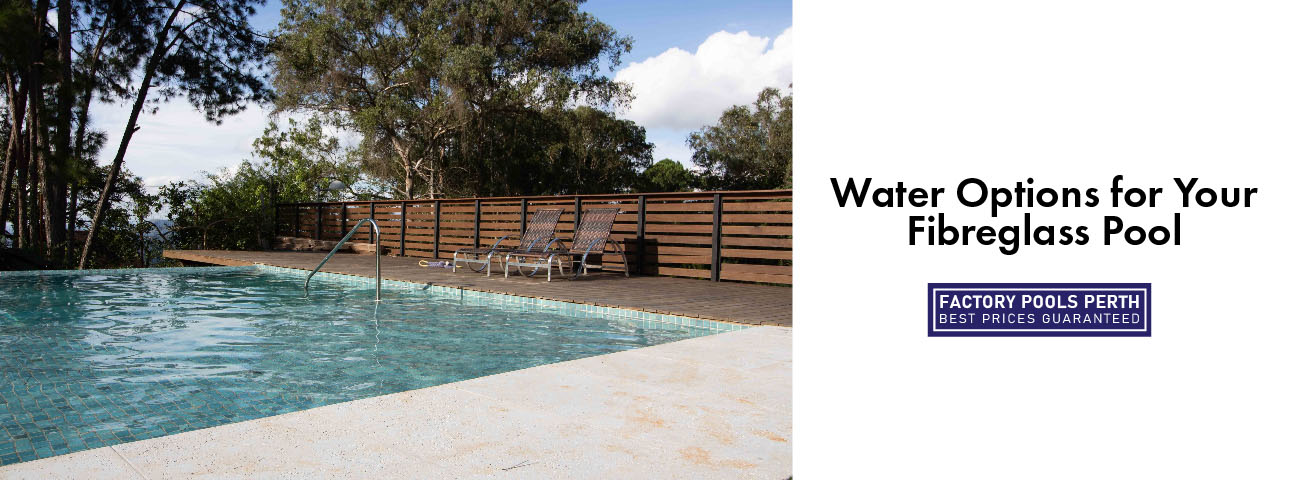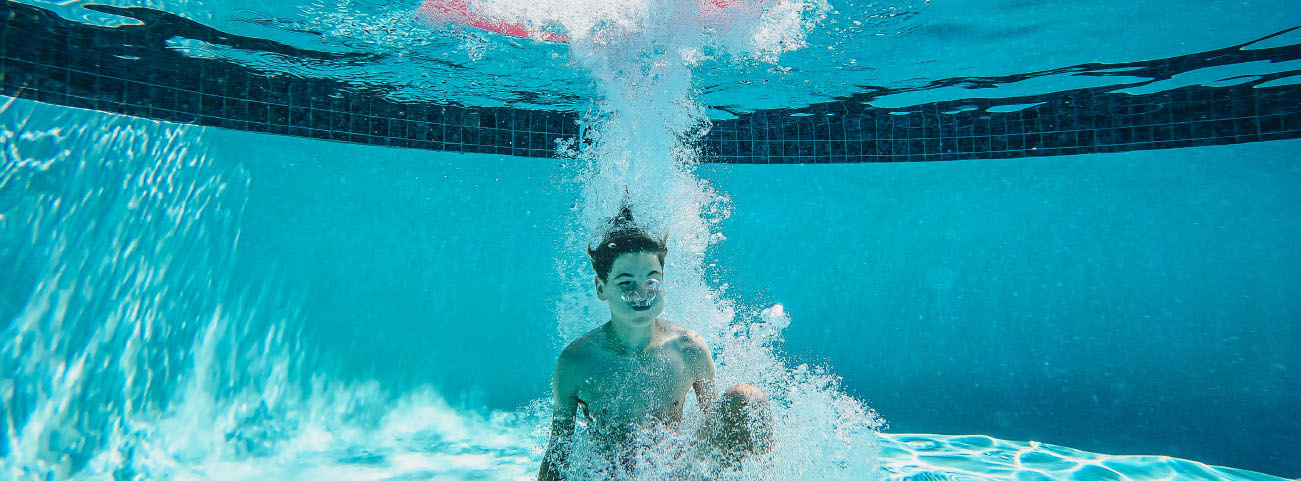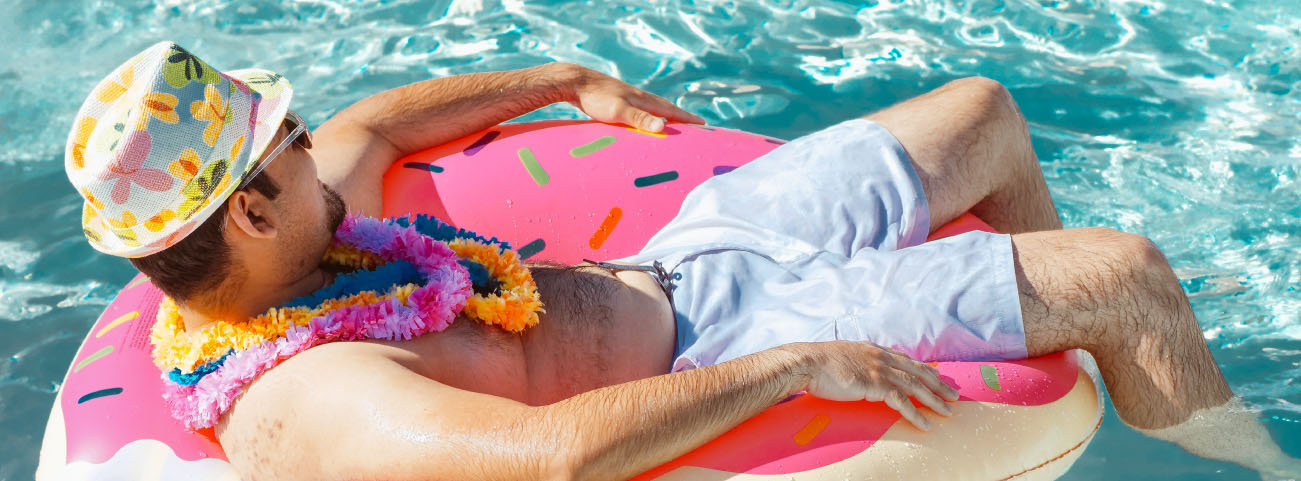Water Options For Your Fibreglass Pool
The type of water you choose for your swimming pool is an essential part of the pool planning stage. Researching and learning about all of the options, and how they are maintained will make you more comfortable when it comes to determining the sanitising method for your family’s pool.

You can ask for feedback from your neighbours or friends to find out why they use one over the other. You should also consult with pool companies to help suggest a solution that will suit your needs. You might choose the type of water for your pool based on operational costs. Prices vary and how they are used and maintained is also different. So spending the time to find out what will work best for you and your family will make a huge impact moving forward. See below to get an idea of what’s available and why it might work for you.
Wondering how to maintain your swimming pool water? Click here!
Saltwater
Firstly let’s bust a myth and misconception around salt water. Saltwater pools will not sting your eyes, or leave a strong taste in your mouth like if you were swimming in the ocean. This is because they do not contain a large amount of salt. The taste will be subtle, more like the taste of a teardrop. How the process works is that the salt will be added into your pool and then reacts with the salt cell to produce its own supply of chlorine. Salt is added to the water to essentially treat it to make it hygienic for us to swim in. This is one of the main benefits of getting the saltwater variant as compared to others. Also saltwater feels soft compared to other sanitising methods, and does not cause skin irritation. It is better for your hair and needs lower maintenance too.
A disadvantage of having saltwater is that the added salt is quite corrosive towards some pool materials. It will in time react to every metal component in and around the swimming pool, which means that it will react with any pool ladders, handrails, etc. To avoid this, you can get a sacrificial anode, which is a highly active metal that is used to help prevent corrosion. You should replace anodes every 3 years, or when you see it depleting further than half.
While a saltwater system might be expensive at first, it has low maintenance costs and very negligible operations costs which more than make up for the initial investment. In the long run, you will end up saving money compared to the other methods in water sanitising.

Chlorine
The most common type of water available in the market for years has been chlorine. Chlorinated water has been the top player in the industry even after its introduction many years ago, and it is most widely chosen due to its availability and ease of use.
Theoretically, you can think of the chlorination process as bleaching your pool. It keeps your pool clean with the help of a number of chemical reactions, whilst breaking down bacteria to make them harmless. You can buy chlorine tablets or use a granular chlorine to sanitise your swimming pool. Chlorine is quite pricey as a chemical, and if you allow the chlorine levels to
drop and become unbalanced, your pool could get murky and unhygienic very easily. The idea is to look after your pool via a schedule by adding and maintaining chlorine levels on a weekly basis. This makes it easier to replenish its levels regularly. As the seasons go by, you will realise that chlorinating your pool is one of the most expensive ways to maintain it.
An option is to use chlorine tablets, as they take a longer time to dissolve fully but will last longer. This will provide a stable source of chlorine to the water. You add the tablets through a chlorinator, which is cheap to buy and can be installed by yourself without any hassle. This can also be automated too.
Another option is granular chlorine. This is a coarse form of chlorine that you dissolve in a bucket of water first. Then you can pour it around the boundary of your swimming pool. This will quickly increase the level of chlorine for some time, but eventually it will go down, and you will have to wait until the water is at a safe level before you can swim.
Finally, liquid chlorine is a good choice when it comes to chlorination. This can be added directly into the pool, and it is a quick and easy way to chlorinate the water. The only trouble is it can be a problem storing it, as it generally comes premixed in a bucket or large packets and will take up
a lot of space. Keep in mind a box of granular chlorine or tablets will take a quarter of the amount of space compared to the liquid form of chlorine.
Mineral Water
Choosing or swapping to mineral water for your swimming pool is a great option as there is far less maintenance required than in a traditional chlorine or even salt pool. It is a low chlorine alternative, and the water is filled with minerals such as potassium salts and magnesium that work in tandem to prevent any algae or bacterial growth and keep the pool clean. The chemical reactions that take place between the minerals, the ozone purification technology and your pool reduce the maintenance and costs compared to the other water sanitising options. The water quality has many health benefits and is great for repairing muscles and relaxing your body. It is also very soft and is easier on the eyes. It can also soothe skin conditions, and is great to increase energy, improve sleep and is great for hair and skin elasticity. This water choice is especially one of the best options for people with sensitive skin. Mineral water pools are growing in popularity and switching to them is quite easy and can be done without any problems.
Mineral water or salt water? Weigh up the pro’s and con’s here!

While different pool waters have different benefits and challenges, it is important that you understand and research before making a decision on the water option that best suits you and your family’s needs. At the end of the day, choose the type you are most comfortable with. Different types will require different care from your side. The team at Factory Pools Perth can assist you with any questions to help you make your decision for your fibreglass pool.


